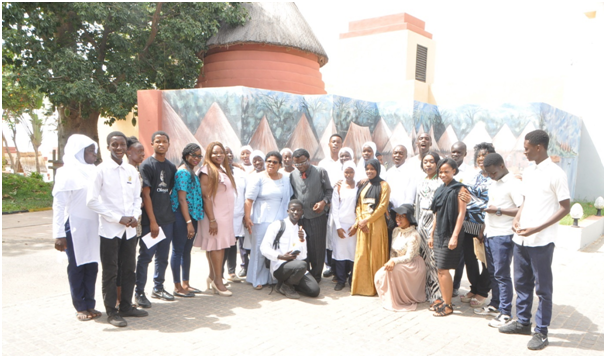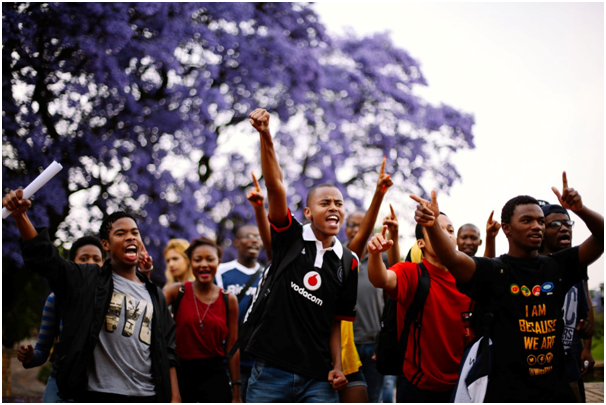
Sophie Kwokori, Human Rights Activist

Mission of our Chapters
To be in the vanguard of holding the AU and its Members accountable to the standards they have set for themselves. We also take it upon ourselves to ensure that the AU is not only known in every corner of the continent, but that every African in some way is involved in its programs and activities. We intend to embark on an AU information blitzkrieg of the continent with the objective of bringing all of us into the AU conversation. We want you to join us.
Working with partners, the Chapters perform the following functions:
 Awareness Raising and Organising Events
Awareness Raising and Organising Events
• The main task of the Sections is to ensure that AU Watch activities are effectively publicized in-country. The Sections use radio, TV, films, social media, newspapers, advertisements, blogs, news and academic journals, web features, op-eds, conferences, workshops, research reports, speaking engagements, and books, to lobby AUMS, to ratify, implement and domesticate human rights instrument. They also work with the in-country CSOs and journalists and their professional unions to raise awareness of the issues of ratification, implementation and domestication of human rights instruments. They work with students and the ordinary African citizen to understand rights protected by the AU organs and why it’s important for AUMS to ratify, implement and domesticate human rights instruments.
• Working in conjunction with media houses and journalists from around the region, AU Watch Chapters lead and participate in a variety of ways to get its message across to AUMS. For example, it sponsors and develops three minutes advertising films on human rights and the importance of African governments supporting the institutions that they have created, including the Soft Laws that emanate from these institutions. The films could be played in a variety of settings like a trailer in film houses, in restaurants and bars, before, at half time and after a major football match.
• Advocacy and outreach activities form a key part of the work of our Chapters. Our Chapters provide audio-visual and print materials for use by community groups or outreach workers. They work with local community organizations to convene discussion groups, road shows, street theatre and community events, helping us reach people who might not ordinarily have access to mass media and facilitate more discussion, deepening our impact and providing vital opportunities for audiences to input into programme-making.
• Working with the Events Unit, our Chapters organizes press conferences / briefings, seminars, yearly schools’ athletics and other sporting competition, schools / colleges debating competitions, moot court competitions for schools and colleges, spelling competitions for junior and senior schools and radio and TV debates on AU matters.
• Our Chapters also organises interviews with leading AU personalities that visits the country.
Research, Evaluation and Analysis
 AU Watch has two dedicated Research Units at the Policy Programs and Administrative Directorate (PPAD) and the AU Organs Polic Directorate. So, in addition to the massive amounts of research and analysis connected with these two programs, the organization is mandated to carry out or commission research and analysis at the country level that strengthens the field and shapes its operations.
AU Watch has two dedicated Research Units at the Policy Programs and Administrative Directorate (PPAD) and the AU Organs Polic Directorate. So, in addition to the massive amounts of research and analysis connected with these two programs, the organization is mandated to carry out or commission research and analysis at the country level that strengthens the field and shapes its operations.
These researches target a variety of audiences, including law and development practitioners, policymakers, national and international organizations, academics, students, media professionals and grass root communities. The objective is for such projects to produce a variety of outputs, including edited volumes, policy and research briefs, guidelines and principles, and reports of different kinds.
The Chapters carry out projects in collaboration with local colleges and universities that are comparative in nature, (sub) regional in scope, and on topics which the PPAD or the other AU Watch directorates do not have the resources to do. These projects are designed to be policy friendly, and at the same time normatively rich, so as to contribute to giving content to issues AU Watch is promoting.
Policy and Media Relations
 Creative, informative and entertaining media outputs are at the core of our approach. Our Chapters make arrangements with national and local radio and TV stations to carry stories about its work. Working in partnership with local media houses AU Watch produces TV news and programs, radio dramas, radio call-in, magazine shows, public service advertisements, billboards and interactive content for mobile phones. The Sections are also involved in development of poverty alleviation projects. The objective is to empower individuals and communities to understand and claim their rights. Through advocacy campaigns, lobbying and practical programs, the Sections aim to influence local and national policy makers to adopt policies and positions that will advance human rights, democracy, good governance, sustainable development, regional integration and much of the objectives of the AU.
Creative, informative and entertaining media outputs are at the core of our approach. Our Chapters make arrangements with national and local radio and TV stations to carry stories about its work. Working in partnership with local media houses AU Watch produces TV news and programs, radio dramas, radio call-in, magazine shows, public service advertisements, billboards and interactive content for mobile phones. The Sections are also involved in development of poverty alleviation projects. The objective is to empower individuals and communities to understand and claim their rights. Through advocacy campaigns, lobbying and practical programs, the Sections aim to influence local and national policy makers to adopt policies and positions that will advance human rights, democracy, good governance, sustainable development, regional integration and much of the objectives of the AU.
Sharing Knowledge and Experiences
 Our Sections provide advice and analysis, share knowledge and experience to help local policy makers formulate policy. They offer training, organize briefings, seminars, and conferences to inform policy on a variety of AU matters. Attendees will include local and national politicians, local and international journalists and media organizations in the country, local and international CSOs, officials from the AU, UN, EU and others. The Sections provide advice and recommendations on constitutional matters, guidelines, principles, and other foundational documents in local justice, governance, human rights and related fields.
Our Sections provide advice and analysis, share knowledge and experience to help local policy makers formulate policy. They offer training, organize briefings, seminars, and conferences to inform policy on a variety of AU matters. Attendees will include local and national politicians, local and international journalists and media organizations in the country, local and international CSOs, officials from the AU, UN, EU and others. The Sections provide advice and recommendations on constitutional matters, guidelines, principles, and other foundational documents in local justice, governance, human rights and related fields.
The chapters take responsibility of all the in-country projects and programs of AU Watch, ensuring that:
a. AU Watch activities are effectively publicized in-country. Such publicity shall involve, for example and where appropriate, organizing interviews with leading AU personalities that will visit the country.
b. Key AU dates (African Human Rights day, AU Day, UN Human Rights Day) are observed and covered by the local media.
c. Schools, colleges and universities include in their curriculum a study of ‘Understanding the Work of the AU’ including the African Human Rights System. AU Watch is developing curriculums for each stage of education in all the AU languages.
d. AU Watch International gets a compilation of an up-to-date directory / analysis of the various development indices of that country. The information will eventually form part of the basis of the development entry of that country in the Yearbooks, ‘State of the Union: Development’; ‘State of the Union: Human Rights’; corruption indices and other publications.
e. AU Watch gets a compilation of an up-to-date directory and analysis of the security issues facing that country. The information will form the part of the basis of a yearly report on ‘Regional Security Index,’ that will be published by the Policy and Programs Directorate.
f. AU Watch gets a compilation of an update-to-date address list, telephone and fax numbers and email addresses of all the relevant government ministries and officials in that country.
g. AU Watch gets a compilation of an up-to-date address list, telephone and fax numbers and email address of all the relevant CSOs in that country. Assist CSOs that do not have a web address to acquire one.
h. AU Watch gets a compilation of an up-to-date address list, telephone and fax numbers and email address of all police stations, prisons and detention centres in that country.